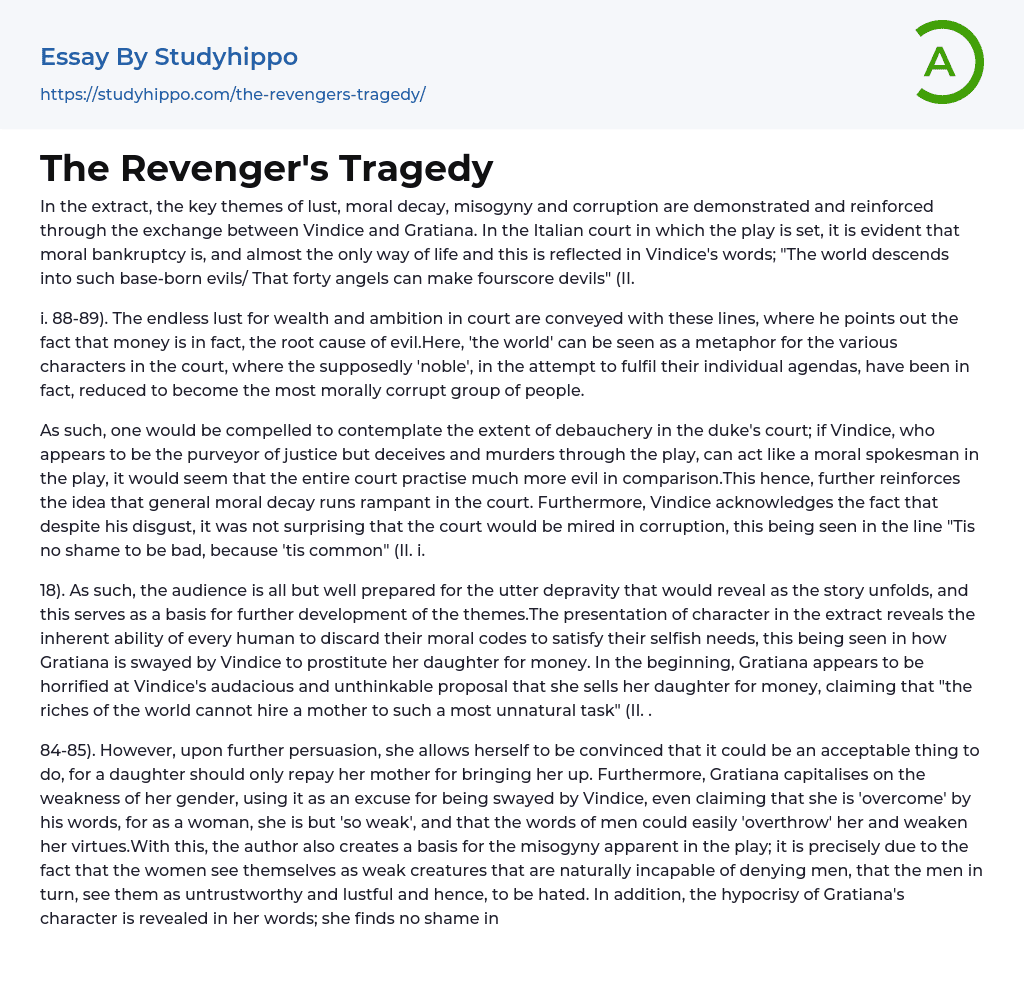In the passage, the conversation between Vindice and Gratiana showcases and reinforces the main ideas of immorality, sexual desire, hatred towards women, and depravation. The play takes place in Italy's royal court where an absence of moral values is the norm. Vindice emphasizes this point by claiming that "the world descends into such base-born evils/ That forty angels can make fourscore devils" (II).
According to lines 88-89, the court's desire for wealth and ambition is conveyed as the root of evil. The metaphor of 'the world' can be seen as representing the court's characters, who, in pursuit of their personal agendas, have become morally corrupted.
The extent of debauchery in the duke's court is subject for contemplation. Vindice, who appears to be the purveyor of justice, deceives and murders throughout the play. Despite this, he acts as a moral spokesman. The court, on t
...he other hand, is portrayed as much more evil in comparison. This further reinforces the idea of general moral decay rampant in the court. Vindice acknowledges this fact and expresses disgust. He states "Tis no shame to be bad, because 'tis common" (II. i.), indicating that corruption is unsurprising within the court.
The story's unfolding reveals utter depravity, catching the audience off-guard as the themes develop. The characterization demonstrates that humans can disregard their morals to satisfy their selfish desires. Vindice convinces Gratiana to prostitute her daughter for money, initially horrifying Gratiana. She adamantly refuses the proposal, stating that "the riches of the world cannot hire a mother to such a most unnatural task" (II. .).
In the play, Gratiana initially resists Vindice's suggestion to engage in incest (84-85). However, she eventually agrees, believing
that it is acceptable because a daughter should repay her mother for her upbringing. Gratiana also uses her gender as an excuse for being swayed by Vindice's words, claiming that she is weak as a woman and that men's words easily weaken her virtues. The author highlights this weakness in women as a basis for the misogyny in the play. Men view women as untrustworthy and lustful because they see them as naturally incapable of denying men. Gratiana's character also exhibits hypocrisy, as she feels no shame in her actions and only seeks reasons to excuse her guilt and responsibility.
Therefore, the theme of widespread moral corruption is forcefully reiterated because a mother would betray even her own flesh and blood for the sake of wealth and advancement in court. Although Vindice is rather morally disoriented despite his clever and manipulative nature. While he condemns the courtiers who sin and discard their morals, he also regards their behaviour as a given; he sees it as a commonplace occurrence. Furthermore, this recognition of moral decay in others does not prevent him from doing the same. To persuade Gratiana to prostitute her daughter, his conscience only goes as far as hoping that she would reject the proposal.
It is apparent that Vindice and the other courtiers are willing to commit great evils in order to achieve their personal goals. Curiously, Vindice likens the way he has infiltrated Gratiana's mind and overpowering her with his words to sexual penetration. He expresses apprehension and fear over this act with the lines "'I e'en quake to proceed, my spirit turns edge, / I fear me she's unmothered" (II. i.).
In his confession
(109-10), Vindice admits to being troubled by the power he holds over Gratiana, highlighting his moral confusion. Despite disregarding morality to achieve his goals, he is unsettled when successful. Vindice's insinuation of "sexual penetration" towards Gratiana foreshadows the later incestuous act in the play. One technique used to great effect is the frequent use of "asides", providing the audience with insight into the characters' inner thoughts, often contradicting their spoken words. Thus, Middleton masterfully presents his characters' ambivalence and complexity to the audience.
The play's often rhetorical style is balanced by the audience's ability to draw their own conclusions about the characters. The recurring imagery of money, such as angels (gold coins), estate, and the phrase 'bring you home', constantly reminds the audience of the theme of corruption. This linear progression serves to anchor the story within its theme. Additionally, Middleton uses foreshadowing in several instances, such as Vindice's supposed 'sexual penetration' of Gratiana, providing clues to later events in the play, including incest.
Through the use of language, presentation, and dramatic techniques, the themes of corruption, lust, and revenge are fully portrayed in the play. The characters' ambivalence requires the audience to consistently question their genuineness. The play's frequent theatrics highlight the hypocrisy present in both the story and real life, emphasizing how life itself can often feel like a performance.
- Values of Life essays
- Ethical dilemma essays
- Normative Ethics essays
- Virtue Ethics essays
- Belief essays
- Deontology essays
- Moral essays
- Virtue essays
- Work Ethic essays
- Acceptance essays
- Age Of Enlightenment essays
- Child Observation essays
- Confucianism essays
- Conscience essays
- Critical Reflection essays
- Destiny essays
- Determinism essays
- Empiricism essays
- Environmentalism essays
- Epistemology essays
- Ethics essays
- Ethos essays
- Existence essays
- Existentialism essays
- Fate essays
- Free Will essays
- Functionalism essays
- Future essays
- Good And Evil essays
- Human Nature essays
- Individualism essays
- Meaning Of Life essays
- Metaphysics essays
- Natural Law essays
- Personal Philosophy essays
- Philosophers essays
- Philosophy Of Life essays
- Political Philosophy essays
- Pragmatism essays
- Reality essays
- Relativism essays
- Teaching Philosophy essays
- Time essays
- Transcendentalism essays
- Truth essays
- Utilitarianism essays
- Absolutism essays
- Appeal essays
- Bourgeoisie essays
- Contras essays




